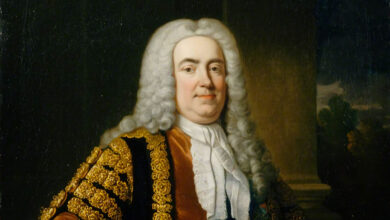Podcast: Play in new window | Download
Subscribe: Spotify | Amazon Music | Youtube Music | RSS
Have you ever considered how one woman’s determination could forever change the course of history? Meet Emmeline Pankhurst, a beacon of courage in the face of adversity. Her indomitable spirit and unyielding resolve played a pivotal role in the women’s suffrage movement in the United Kingdom. Pankhurst’s tenacious fight for women’s right to vote wasn’t just a personal victory; it was a revolutionary impact that forever altered societal norms and expectations. To fully understand the magnitude of her impact, let’s delve into the life of Emmeline Pankhurst.
Born Emmeline Goulden in Manchester in 1858, she was introduced to the women’s suffrage movement from a young age. Her parents, politically active and firm believers in gender equality, instilled in her the importance of political activism. Emmeline was exposed to the struggle for women’s rights as she attended suffrage meetings with her mother, igniting a lifelong passion for equality. Her education, largely unconventional for women at the time, further shaped her views. She attended École Normale Supérieure, a French school known for its progressive approach to education. This experience broadened her horizons and reinforced her belief in the need for women’s rights. Emmeline’s early political activism began with her joining the Women’s Franchise League at the tender age of twenty. This organization fought for women’s rights, particularly the right to vote. Emmeline’s involvement in the league was a significant stepping stone in her journey towards becoming a suffragette icon. It was these formative experiences that set Emmeline on her path to becoming a leading suffragette.
In 1903, Emmeline Pankhurst, frustrated with the lack of progress made by the National Union of Women’s Suffrage Societies, founded the Women’s Social and Political Union. This was a pivotal moment in history as it marked the birth of the suffragette movement, a movement that would redefine the role of women in society. The creation of the Women’s Social and Political Union was not just a reaction to the slow pace of change, but also a call for a new approach. Emmeline Pankhurst and her comrades believed that polite petitions were not enough to bring about the change they desired. They needed to take more radical actions. Thus, their motto, ‘Deeds, not words’, was born. The Union’s tactics were diverse and often controversial. They ranged from peaceful protests to more militant actions like window smashing, arson, and even hunger strikes. One notable event that encapsulated their spirit was the 1908 Hyde Park rally. This event saw over two hundred thousand people gathered in support of women’s suffrage, demonstrating the growing public backing for the cause. Emmeline Pankhurst’s leadership throughout this period was unwavering. Despite facing numerous arrests and imprisonments, she remained resolute. Her determination to fight for women’s rights never faltered, even in the face of immense adversity. Emmeline Pankhurst, undeterred by numerous arrests and imprisonments, remained at the forefront of the suffragette movement. After years of relentless struggle, Emmeline Pankhurst’s efforts began to bear fruit when the Representation of the People Act was passed in 1918.” This monumental act of legislation marked a significant turning point in the fight for women’s suffrage in the United Kingdom. It granted voting rights to all men over the age of twenty-one, and to women over the age of thirty who met certain property qualifications. Although it was not full equality, it was a giant leap forward, and it was in no small part due to the tireless efforts of Emmeline Pankhurst and her fellow suffragettes. Emmeline’s role in the passage of this Act cannot be overstated. She was the driving force behind the Women’s Social and Political Union, the group that had fearlessly campaigned for women’s right to vote. They had faced ridicule, imprisonment, and even violence, but they never wavered in their conviction. They knew the value of their cause, and they were willing to fight for it with every breath in their bodies. As the years rolled on, Emmeline did not rest on her laurels. She continued to be a force to be reckoned with in the political arena, even becoming a candidate for the Conservative Party in 1927. However, her health was failing, and she died on June 14, 1928, just weeks before the Equal Franchise Act was passed, granting equal voting rights to all women over the age of twenty-one. It was the culmination of a life’s work, a victory she did not live to see, but one that would not have been possible without her. Emmeline Pankhurst’s legacy is one of courage, resilience, and unwavering dedication to the cause of equality. Her name is synonymous with the fight for women’s suffrage, and her story continues to inspire countless individuals across the globe. “Emmeline Pankhurst’s legacy continues to inspire and empower women around the world, a testament to her indomitable spirit and unwavering commitment to equality.
Podcast: Play in new window | Download
Subscribe: Spotify | Amazon Music | Youtube Music | RSS




